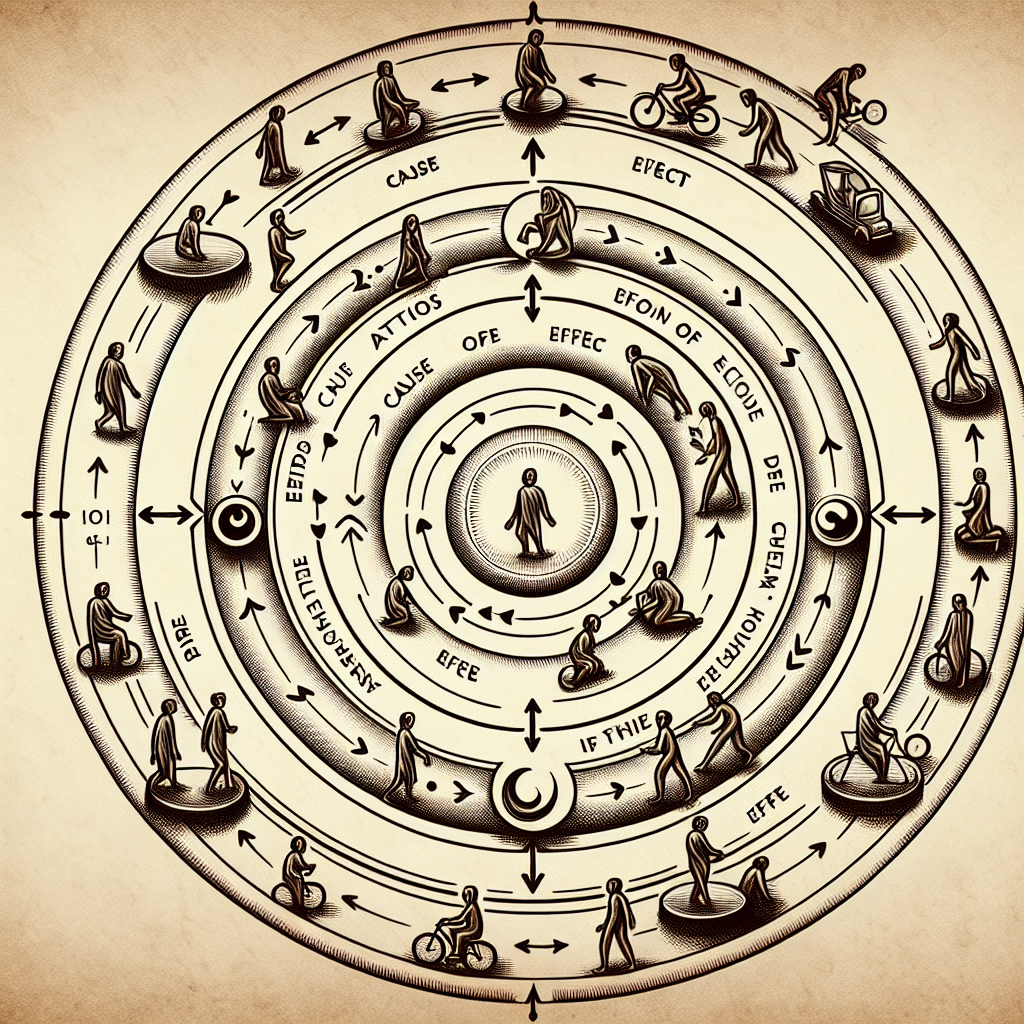Introduction to Karma
Karma is a concept deeply rooted in various philosophical and spiritual traditions, particularly in Hinduism and Buddhism. It posits that every action has consequences, and these consequences can manifest either in this lifetime or in future ones. The essence of karma encourages individuals to act with awareness and mindfulness, fostering responsible behavior and ethical choices.
Understanding the Concept of Karma
At its core, karma refers to the moral law of cause and effect. The word “karma” itself is derived from the Sanskrit word “karman,” which means action or deed. It is often associated with the following key principles:
- Causality: Every action or deed leads to a reaction, either positive or negative.
- Intent: The intention behind an action significantly influences the quality of the karma generated.
- Cycle of Rebirth: In many traditions, karma influences the cycle of birth, death, and rebirth (reincarnation).
- Personal Responsibility: Individuals are responsible for their actions and must face the consequences that arise from them.
The Three Types of Karma
Karma can be categorized into three distinct types:
1. Sanchita Karma
Sanchita karma refers to the accumulated actions from all past lives. It is like a reservoir of karma that remains until it is balanced through experiences in future lives. This form of karma is often described as the backlog that influences one’s current life circumstances.
2. Prarabdha Karma
Prarabdha karma is the portion of karma that is currently active and is responsible for the present life experiences. It is the karma that has ripened and is being worked out in the present moment. This type of karma shapes the life individuals are currently living and is often described as the destiny that one faces in this life.
3. Kriyamana Karma
Kriyamana karma, also known as agami karma, refers to actions that are being performed in the present and their immediate effects. This type of karma is the result of one’s current choices and actions, which will contribute to future karmic consequences. It emphasizes the importance of present behavior in shaping future experiences.
The Moral Implications of Karma
Karma has profound moral implications that encourage individuals to lead a life of integrity and mindfulness. Understanding karma can help foster a sense of accountability and ethical behavior. Here are a few essential takeaways:
- Awareness: Being conscious of one’s actions and their potential consequences is vital in the practice of karma.
- Compassion: Engaging in actions that promote kindness and compassion leads to positive karma.
- Ethical Living: Acting ethically and cultivating positive intentions can have a lasting impact on one’s karma and overall life experience.
Karma in Different Cultures and Philosophies
While karma originates in Eastern traditions, variations of the concept can be found in various cultures and beliefs around the world.
Hinduism
In Hinduism, karma is a fundamental concept that surpasses mere actions, encapsulating bodily, verbal, and mental deeds. The idea of dharma, or righteousness, is deeply intertwined with karma, as it guides individuals on how to live a fulfilling life while being mindful of their actions.
Buddhism
Buddhism supports the concept of karma, emphasizing that unwholesome actions lead to suffering, while wholesome actions promote happiness. The practice of mindfulness in daily life serves to rectify negative karma accrued through ignorance or malice.
Other Philosophies
Various other philosophies, including some interpretations of modern Western thought, recognize the notion of actions leading to consequences. Concepts such as the Golden Rule—treating others as you wish to be treated—are echoed in discussions about karma across cultures.
The Role of Intent in Karma
Intent plays a crucial role in karmic outcomes. Actions performed with negative intentions can generate harmful karma, while actions undertaken with positive, altruistic intentions can lead to beneficial outcomes. This emphasizes the importance of aligning one’s thoughts and actions harmoniously.
Karma and Free Will
The relationship between karma and free will is complex. While karma suggests that actions have consequences that affect future experiences, individuals still possess the free will to choose their actions in the present. This interplay illustrates that while past actions may create certain conditions, present choices ultimately shape future karma.
Real-Life Applications of Karma
Understanding karma can empower individuals to approach life with intentionality and purpose. Here are a few ways to apply the principles of karma in everyday life:
- Practicing Kindness: Engaging in small acts of kindness can create a ripple effect of positivity.
- Mindful Decision-Making: Consider the potential consequences of actions before making decisions.
- Learning from Mistakes: Use lessons from past actions to inform and improve future behavior.
- Fostering Gratitude: Embrace an attitude of gratitude, recognizing the interconnectedness of all beings.
Conclusion
In conclusion, karma is more than just a spiritual concept; it serves as a guiding principle for individuals seeking to lead meaningful and responsible lives. Understanding the basics of karma and its implications can inspire transformative changes that not only benefit oneself but also foster a compassionate and harmonious society. By recognizing the impact of one’s actions and intentions, individuals can cultivate a life that resonates with positivity and responsibility.
FAQs
1. What is karma?
Karma is a spiritual and philosophical concept that suggests every action has consequences, influencing one’s future experiences based on the nature of those actions.
2. How does karma affect my life?
Karma can influence various aspects of life, including relationships, opportunities, and overall circumstances. Positive actions may lead to beneficial outcomes, while negative actions can produce challenges and difficulties.
3. Can karma be changed?
Yes, individuals can change their karma by making conscious choices and taking positive actions in the present, which can lead to improved circumstances in the future.
4. Is karma related to reincarnation?
In many traditions, karma is closely tied to the concept of reincarnation, wherein the actions in one life influence the circumstances of future lives.
5. How can I improve my karma?
You can improve your karma by practicing kindness, being mindful of your actions, cultivating positive intentions, and learning from past mistakes to make better choices moving forward.
, It looks like you may have entered “Prompt” without additional context. Could you please provide more details or clarify what you would like assistance with? Whether you’re looking for writing prompts, questions, or topics to discuss, I’m here to help!, #Basics #Karma, #Basics #Karma, 1734055015, the-basics-of-karma-what-you-need-to-know




